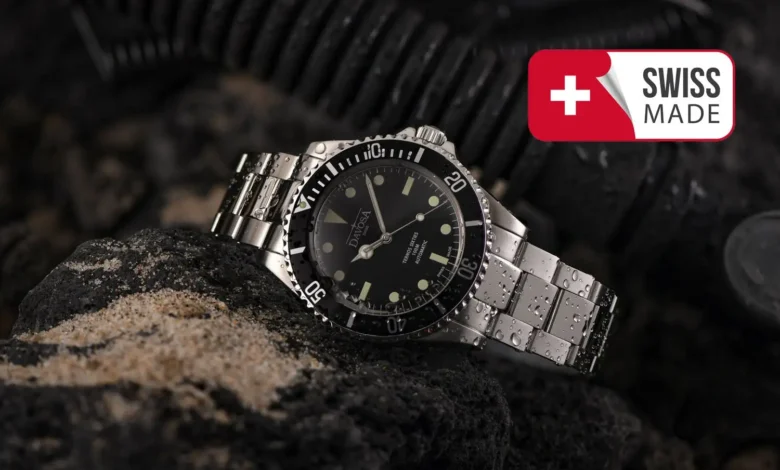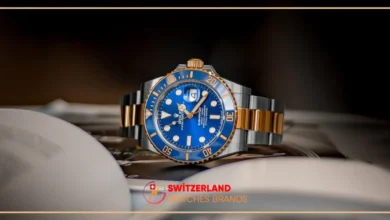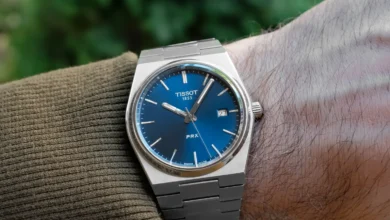Swiss Made Label: What It Means and Why It Matters

The “Swiss Made” label is one of the most powerful marks in the global watch industry. For over a century, it has symbolized not only where a watch was manufactured but also the highest standards of craftsmanship, precision, and durability. In today’s luxury market, understanding the Swiss Made meaning is essential for both collectors and investors.
What Does Swiss Made Mean? – The Legal Definition
The term “Swiss Made” is strictly regulated by Swiss law. A watch can only carry this label if it meets the following requirements:
-
At least 60% of the production costs are generated in Switzerland.
-
The movement is Swiss, meaning it was assembled and inspected in Switzerland.
-
Final assembly and quality control must take place in Switzerland.
This legal framework ensures that the label is not just a marketing term, but a guarantee of authenticity and quality recognized worldwide.
Swiss Made vs. “Made in Switzerland”
A common question among buyers is the difference between Swiss Made vs. Made in Switzerland. While they sound similar, in practice:
-
Swiss Made is the official label with a legal definition tied to production and assembly.
-
Made in Switzerland is a broader designation and not as tightly regulated in the watch industry.
Collectors and consumers generally perceive Swiss Made watches as more prestigious, because the label carries the weight of tradition and strict regulation.
Why Swiss Made Watches Matter to Consumers
For consumers, Swiss Made watches are associated with:
-
Quality & Reliability: The highest precision and durability.
-
Luxury Status: A symbol of success and refined taste.
-
Heritage: Over 200 years of horological tradition and innovation.
Whether it’s a Rolex, Omega, or Patek Philippe, the presence of “Swiss Made” on the dial reassures buyers that they are wearing more than just a timepiece—it’s a cultural icon.
Importance for Consumers
From an investor’s perspective, the Swiss Made meaning goes far beyond branding. Because of their scarcity, craftsmanship, and global demand, Swiss Made watches often retain or even appreciate in value.
-
Rolex Submariner and Daytona models consistently outperform retail prices on the secondary market.
-
Patek Philippe’s Nautilus and Aquanaut series have become some of the most desirable investment pieces.
-
Independent Swiss Made brands, like Audemars Piguet, also command strong resale value.
This makes Swiss Made watches not just luxury accessories, but also reliable investment assets.
Conclusion: The Timeless Power of Swiss Made
In the luxury watch world, the Swiss Made label stands as a guarantee of craftsmanship, heritage, and investment value. Whether you are a passionate collector or a first-time buyer, knowing the Swiss Made meaning helps you make smarter choices and appreciate the true value behind the dial.
When comparing Swiss Made vs Made in Switzerland, always remember: “Swiss Made” is more than a label—it’s a legacy.
Official Requirements and the FH Guidelines
For a watch to be officially labeled as “Swiss Made,” it must meet strict legal standards—not just rely on brand perception. These requirements are defined by the leading authority of the Swiss watch industry, the Fédération de l’industrie horlogère suisse (FH) – the Federation of the Swiss Watch Industry.
To help watch companies better understand these rules, FH has published the official guide titled “Guidelines for the Use of the Designation ‘Swiss’ on Watches.” This document provides a clear and detailed explanation of when a timepiece can legitimately carry the Swiss Made label and when the designation cannot be used.
Thanks to these regulations, Swiss Made watches stand out not only because of their place of origin but also because they guarantee quality, precision, and reliability. In short, the FH’s comprehensive guidelines clarify the true Swiss Made meaning for both watch manufacturers and consumers, while preserving the global prestige of the label.
https://www.fhs.swiss/file/8/Guide_FH_v.5_en.pdf
When it comes to high-end timepieces, few marks carry as much weight as the designation that links a watch directly to Switzerland. Collectors, investors, and everyday buyers often wonder what it really takes for a brand to earn that distinction. Below are the key points to understand.
What Are the Requirements?
For a watch to carry the label, several legal standards must be met. These include:
-
At least 60% of the production costs must be generated in Switzerland.
-
The movement (the heart of the watch) has to be assembled and inspected locally.
-
Final assembly and quality checks must also take place within the country.
These conditions guarantee authenticity, precision, and reliability—hallmarks that have shaped the reputation of Swiss horology for centuries.
What Are the Rules of “Swissness”?
The concept of Swissness goes beyond watches; it’s a broader legal framework designed to protect the integrity of products associated with Switzerland. For watches, this means strict oversight to ensure that the claim reflects true origin and craftsmanship, not just clever marketing.
How Can a Watch Earn the Label?
Brands must comply with the regulations enforced by the Federation of the Swiss Watch Industry (FH). This organization publishes detailed guidelines clarifying when a watch qualifies and when it does not. Only after meeting these standards can a company legitimately use the label on its dials or marketing.
Difference Between “Swiss” and “Made in Switzerland”
At first glance, the two expressions may appear identical, but there’s an important distinction:
-
The official label is tied to specific legal definitions and technical requirements.
-
“Made in Switzerland” is a broader statement and is not as tightly regulated in the watch industry.
Collectors generally view the official label as more prestigious, because it carries centuries of tradition and legally binding criteria.
For both newcomers and seasoned collectors, understanding the rules behind Switzerland’s watch designation helps separate genuine craftsmanship from mere branding. Whether you’re buying your first luxury piece or investing in a future heirloom, knowing these requirements ensures that you get the authenticity, precision, and long-term value that Swiss watchmaking is famous for.





